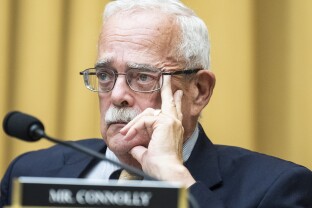Democrats from Virginia are bracing for their constituents, which include large numbers of federal employees, to be among the hardest hit by a set of executive orders that President Donald Trump signed within hours of taking office.
Trump’s orders — which include efforts to strip protections from career employees and bring remote workers back to the office — would scramble the day-to-day reality of thousands of federal workers’ jobs. Virginia Democrats, who are very familiar with the expertise and makeup of federal employees, are concerned about what these orders will mean in the short and long term for how government functions.
“It will have a chilling effect on our federal employees, from calling out abuses of power or instances where the executive branch tries to overstep its authority,” Rep. Jennifer McClellan told NOTUS. She added that recategorizing federal employees in a way that would make it easier to fire career employees, widely called Schedule F, is the “first step” in reshaping the federal government to give Trump more leverage.
Democrats also say putting these executive orders into practice is not so straightforward, including the end of remote work for federal employees.
“Ending the ability to telework — if it’s done overnight, not phased in, it can have significant impacts with a lot of agencies,” Rep. Bobby Scott, whose district is home to nearly 30,000 federal employees, told NOTUS. “So many people telework, and no one has a dedicated desk.”
“And traffic is already bad enough coming into Washington, D.C.”
Trump has long promised to shrink the federal government and target employees in his efforts to get rid of what he calls the “deep state.” At least one of those orders — the one known as Schedule F — is the return of a categorization his administration created during his last administration. Former President Joe Biden revoked the order in 2021 and took steps to make its return more difficult. Democrats anticipated Trump would bring it back in efforts to create a more “efficient” federal government.
Rep. Gerry Connolly, who introduced legislation in response to Trump’s initial effort to introduce Schedule F, expressed concern about what the orders could mean for institutional knowledge in the federal government. The legislation, Saving the Civil Service Act, has stalled out on Capitol Hill.
“It’s going to cause plummeting morale,” Connolly told NOTUS. “It’s going to accelerate retirements, early retirements, which people just want to get out, not deal with this. It’s going to make their replacement, the recruitment of their replacement, with the new generation, very, very complicated, problematic. Who the hell wants to come and work for the federal government with this mess going on?”
Connolly, the ranking member of the House Oversight Committee, said congressional Democrats will be looking into Trump’s order in the coming days to determine exactly what they can do.
Virginia Sens. Tim Kaine and Mark Warner released a statement on Tuesday calling Trump’s actions “attacks” on the federal workforce.
“We appreciate the steps the Biden Administration took to complicate Trump’s ability to put this order into motion and will continue to push for our legislation to halt it altogether,” the senators said in the statement.
Rep. Don Beyer, who also represents a district with a large number of federal employees, said in a statement on Wednesday that he also wants Congress to respond to the Schedule F executive order through legislation.
“I believe that Trump’s order is clearly illegal, but in this judicial environment preventing this order from taking effect may require robust legal challenges and ultimately passage of the Saving the Civil Service Act, which I strongly support,” Beyer said in the statement.
The Trump administration did not respond to a request for comment. Virginia Gov. Glenn Youngkin, a Republican and Trump ally, also did not respond to a request for comment.
The fallout of the orders is being closely watched beyond Virginia. Maryland Rep. Steny Hoyer, who long served in Democratic House leadership, said in a statement the orders “undermine” federal workers’ ability to deliver constituent services. And the AFL-CIO released a statement promising to back federal workers.
One union, the National Treasury Employees Union, filed a lawsuit in response to the Schedule F executive order, arguing the order is “contrary to congressional intent.” The NTEU did not respond to a request for comment.
Virginia state Del. Adele McClure, who represents an Arlington district in the suburbs of Washington, argued that requiring all employees to be physically in the office will reduce overall productivity.
“A lot of people are scared and don’t exactly know what to expect, but I do expect to hear from folks pretty soon, right as these start to kind of show themselves and, you know, really impact the employees in my district,” McClure said. “My advice would be to try to continue moving forward and keeping our government running.”
—
Amelia Benavides-Colón is a NOTUS reporter and an Allbritton Journalism Institute fellow.
Sign in
Log into your free account with your email. Don’t have one?
Check your email for a one-time code.
We sent a 4-digit code to . Enter the pin to confirm your account.
New code will be available in 1:00
Let’s try this again.
We encountered an error with the passcode sent to . Please reenter your email.


